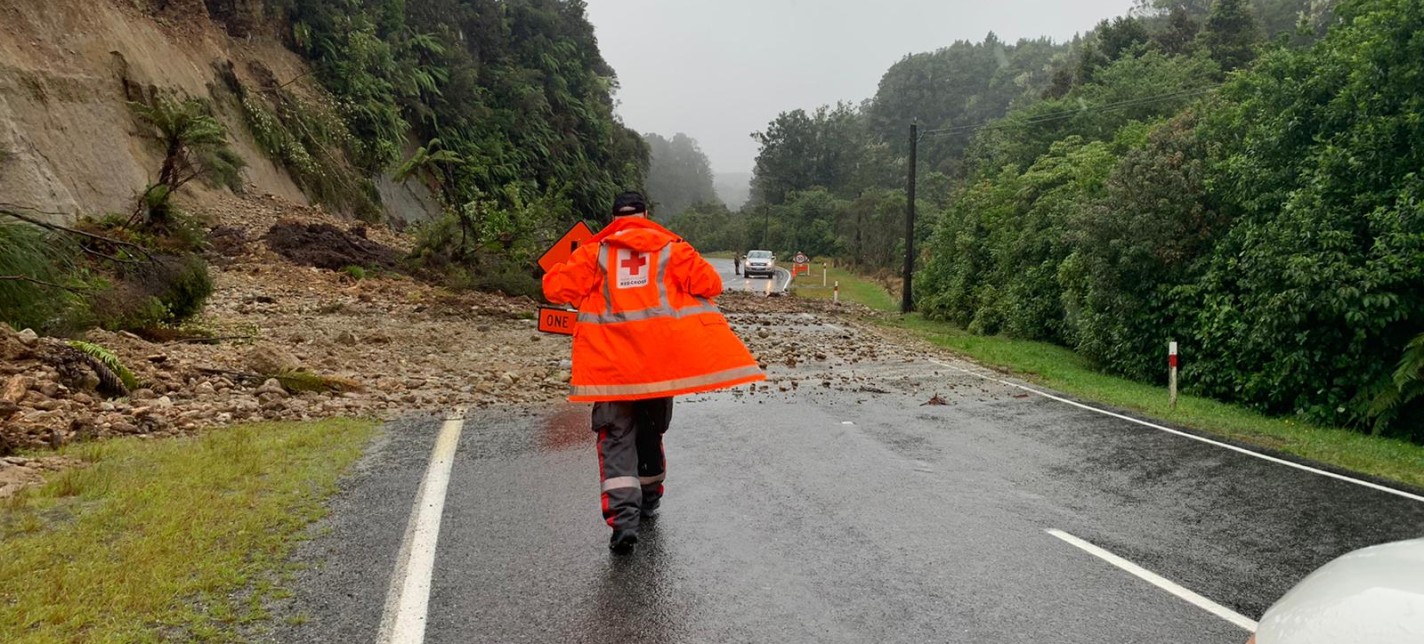Disaster and emergency support


When there’s a disaster or other large emergency in Aotearoa New Zealand – we’re there to help. We also work to help communities better prepare for an event and to build their resilience.
New Zealand Red Cross has supported communities before, during and after disasters for nearly 100 years.
During a disaster, we have a mandated role under the National Civil Defence Emergency Management Plan, and we can assist in other ways as needed.
Responding to disasters
Our role in a disaster or other emergency is focused on supporting the welfare of people affected. We work as part of a team alongside other disaster response agencies – each with a particular area of responsibility.
Depending on the type of event, the response is often coordinated by the National Emergency Management Agency (NEMA) or the local authority Civil Defence group. They are supported by other agencies such as Fire and Emergency New Zealand, New Zealand Police, New Zealand Defence Force, St John and New Zealand Red Cross.
Our role is usually focused on looking after people’s emotional and physical welfare. This might include:
- Setting up and providing support in evacuation centres.
- Undertaking needs assessments to understand what support people need.
- Providing psychosocial support, which includes peoples' emotional, practical and social needs.
Much of this work is carried out by our volunteers working as part of a Disaster Welfare and Support Team.
Disaster Welfare and Support Teams
We have more than 300 disaster response volunteers trained and ready to go at short notice. Our 20 Disaster Welfare and Support Teams (DWST) are located around the country from Invercargill to Whangarei.
In a disaster, several teams may be called up to respond. Our teams are well-equipped with welfare equipment including stretchers, bedding sets for evacuated people, first aid kits, and vehicles. Equipment can be moved around the country as needed.
Emergency preparation and resilience
We have an equally important role in helping communities get better prepared so they can be more resilient when a disaster or emergency happens. We build resilience through activities like our community engagement, and our Good and Ready programme.
Community engagement
Our Meals on Wheels service not only provides a daily meal to vulnerable people, it also connects them to the wider community. Our volunteer drivers gain and awareness of their needs and circumstances, which means New Zealand Red Cross can better support them in the event of an emergency or disaster.
Fundraising
In the event of a devastating disaster here or overseas, we may launch an appeal for funds to support the relief effort. We also work with our Disaster Response Alliance partners – businesses that help us raise funds in response to disasters and significant emergency events.
We always promote the idea that ‘cash is best’ to people wanting to help following a crisis.
Disaster Response Alliance partners information
International disaster response
We also work to help our Pacific neighbours prepare for emergencies including climate change-related weather events, and we assist with the response when a disaster hits.
Information about disaster work in the Pacific
Resources
Our disaster management strategy outlines how we work and what we are seeking to achieve in our work in disaster preparedness and response.
New Zealand Red Cross Disaster Risk Management Strategy 2018 – 2023
Psychosocial support is the term we use for the emotional and practical support we offer people who have been affected by a disaster. This framework describes our approach.
Psychosocial Support Framework
We also run workshops to support communities to help themselves recover after a disaster.
Recovery Matters workshops information
The Pasifika Reference Group (PRG) was set up in 2017 to support New Zealand Red Cross to engage with Pasifika communities across Auckland.
In 2020, the PRG carried out a survey to find out how the Pasifika community responded to and coped with the Covid-19 alert levels from 21 March to 8 June 2020.
This report provides insights and guidance for community organisations working with Pasifika communities in the future to help them prepare for other large-scale disasters.
